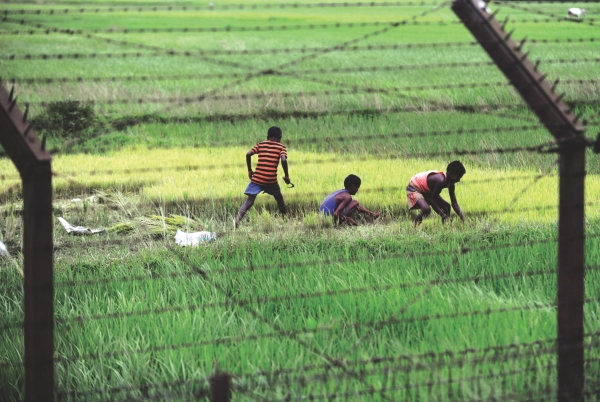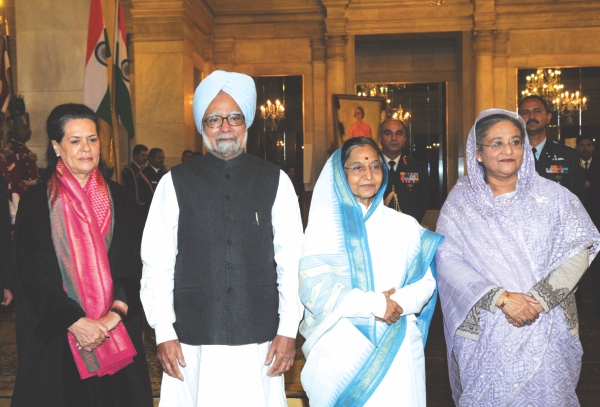
Inside
|
 PHOTO: AFP
PHOTO: AFP
The Art of Negotiations in Bilateral Relations
ZIAUDDIN CHOUDHURY
There is no last word in politics, just as there is no last word in diplomacy. In a complex world of international relations words do matter, but these are open to interpretations, nuances, and subject to changes with dynamics of time. No political leader worth his salt will ever say a final word on any subject; no diplomat will ever leave a negotiating table announcing that he was never going to return. Every discussion, every negotiation is a lengthy affair, particularly when it affects two countries in a discussion. This is more so when both parties want to bargain the best deal for themselves and yet make the other party not to appear as a loser. How do you perform this tango? The answer is negotiation, negotiation, and negotiation. You do not stop until you both agree on a common ground.
The recent failures to have an agreement with India on Teesta water sharing, and transit through Bangladesh have figured mightily in the media and political circles, particularly in Bangladesh. These failures put a sour note on a much hyped visit of the Indian PM, despite many other positive achievement including revival of the much delayed enclaves transfer between two countries. Our media and some of our political leaders have taken the failure on Teesta agreement as a litmus test of India's good will and good neighborly relationship to Bangladesh. The West Bengal Chief Minister has been portrayed as the principal saboteur of an otherwise “done deal” for her reported objection to the quantum of water sharing between two countries. Our collective disappointment over this failure to have an agreement on Teesta has been so great that many of us have not hesitated to call the entire visit a flop, a non-performer.
This has given birth to a wide range of analyses in the media, in the civil society, and of course the political partiesour ineptitude to deal with a mighty neighbor, political weakness of our leaders, and bad faith. It would seem that a single lapse has cast a deep shadow over our forty-year relationship. Should Teesta agreement alone be the litmus test to judge our relationship with India? Have we reached the end of the road when we could not reach agreement on one subject among dozens of other important national interests for which we depend on India?
We may not have an exact log of the days and months that the countries have spent negotiating the two issues river water and transit over last several years. What we do know that large expectations had been built over time for a mutually satisfactory resolution of the issues in this last visit. To Bangladesh's chagrin the water agreement did not happen. We cannot confirm if the disappointment was equal for India for not signing the transit agreement. Were the two failures due to political reasons or inadequacy of our negotiating skills?
 PHOTO: AFP
PHOTO: AFP
Politics is an important part of bilateral relationship; we cannot ignore that. No country would like to appear as appeasing a foreign country by foregoing its own interests. No deal should be shown as a sacrifice. Quid pro quo is the principle that guides a bilateral deal. You give me some; I give you some in return. I guess not signing the transit treaty by Bangladesh without the Teesta water sharing makes some sense in that regard. Should we hold on to that position, or separate the two and make progress through further negotiations and obtain an optimal result acceptable to both countries?
The debacles in the Indian PM's visit have unfortunately led to finding scapegoats instead of understanding the deep nature of international relations and complexity of negotiations. Treaties and agreements between countries take long years, and sometimes these may not even happen. Yet no country gives up on these simply because they are time consuming. They persist, and keep on trying.
Experts who have developed negotiations into a science agree on five keys to successful negotiation. First of these is to know what you want. The clearer you are on your interests and goals, the better your chance of success increases. Second, know the other party well. If one knows how to listen, one can also understand the other side better. Third, consider the timing and method of negotiations. Change the game to win-win problem solving by negotiating from a platform of interests, not positions. Fourth, offer benefits for accepting your offer; you are much more likely to close if you present the benefit to the other side. Prepare options for mutual gain. The last is to know how to walk away gracefully if no agreement is in sight without adversely affecting the relationship.
Experts also have commented on how to pick up stalled negotiations. Changing the way you think about negotiating (joint problem solving versus a series of compromises where one party may win and one may lose) is the first step towards getting better results. Recognizing the reasons why people act the way they do, and having the ability to communicate to a broad range of stakeholders and their behavioral styles offers the negotiator the ability to reach satisfactory outcomes more consistently.
In my rather short career in the civil service in early seventies I was exposed to two serious negotiations, one on trade with India in 1973, and another on repatriation of Rohingya refugees to Burma (now Myanmar) in 1979. The first was almost a cake walk since in our fledgling days the relationship with India was cushioned with much compassion from India. Even then the agreement was preceded by months of negotiations at working level on both sides, ultimately resulting in signing by two Commerce and Foreign Trade Ministers. Drafts were written and re-written, words were changed, and offending paragraphs modified by both sides. In 1973 Bangladesh was only at the receiving end, but even then negotiations were important.
Relative to the Trade Agreement with India in 1973, the repatriation agreement with the Burmese authorities in 1979 was tough, fraught with great tension on both sides, and apprehension that talks might fail at the last moment. What sustained the talks and led to the agreement was a genuine desire on both sides to have an agreement satisfactory to both countries. Patience, listening skills, and personal rapport between participants on both sides at the working level played a great role in the final agreement. We were able to repatriate almost all of the two hundred thousand refugees back to their homeland by the end of 1979.
It is too hasty to term the recent inabilities to arrive at an agreement with India on both Teesta river and transit issues as serious setbacks to our mutual relationship. We will soon be back to discussing these items, and hopefully we will find solutions that are acceptable to both of our countries. In order to do that however, we need to have professionals who will do the ground work, because it is the professionals who lay the basis on which the policy makers make their decisions. This ground has to be built at working level by people who understand and have the competence and skills of negotiations that I have discussed earlier. We need good relations with India, just as India does; we perhaps more out of practical necessity than India. Let us not pander to our pessimistic thoughts and conduct because of what we could not achieve last month. With persistence, patience, and serious negotiations we can reach our goals.
Ziauddin Choudhury works for an international organization in the USA.